@davidkpiano · React Finland 2018
Reactive State Machines
And Statecharts
isLoading
loading
shame on you


The most neglected variable is time.
📞
🔙
🙏🤐
🅰️⚓️
🅰️🏋️♀️
🔭
🅰️
⚽️🎾🎱
Callbacks
Promises
Async-Await
Observables
Any sufficiently complicated model class contains an ad-hoc, informally-specified, bug-ridden, slow implementation of half of a state machine.
state management library
#Frameworkless
How can we model the behavior
of user interfaces?
API
Human
-
documented
-
predictable
-
testable
-
un
-
un
-
un
// ...
onSearch(query) {
fetch(FLICKR_API + '&tags=' + query)
.then(data => this.setState({ data }));
}
// ...Show data when results retrieved
// ...
onSearch(query) {
this.setState({ loading: true });
fetch(FLICKR_API + '&tags=' + query)
.then(data => {
this.setState({ data, loading: false });
});
}
// ...Show loading screen
Show data when results retrieved
Hide loading screen
// ...
onSearch(query) {
this.setState({ loading: true });
fetch(FLICKR_API + '&tags=' + query)
.then(data => {
this.setState({ data, loading: false });
})
.catch(error => {
this.setState({
loading: false,
error: true
});
});
}
// ...Show loading screen
Show data when results retrieved
Hide loading screen
Show error
Hide loading screen
// ...
onSearch(query) {
this.setState({
loading: true,
error: false
});
fetch(FLICKR_API + '&tags=' + query)
.then(data => {
this.setState({
data,
loading: false,
error: false
});
})
.catch(error => {
this.setState({
loading: false,
error: true
});
});
}
// ...Show loading screen
Show data when results retrieved
Hide loading screen
Show error
Hide loading screen
Hide error
Hide error
// ...
onSearch(query) {
if (this.state.loading) return;
this.setState({
loading: true,
error: false,
canceled: false
});
fetch(FLICKR_API + '&tags=' + query)
.then(data => {
if (this.state.canceled) {
return;
}
this.setState({
data,
loading: false,
error: false
});
})
.catch(error => {
// mitä vittua
if (this.state.canceled) {
return;
}
this.setState({
loading: false,
error: true
});
});
}
onCancel() {
this.setState({
loading: false,
error: false,
canceled: true
});
}
// ...Show loading screen
Show data when results retrieved
Hide loading screen
Show error
Hide loading screen
Hide error
Hide error
Search in progress already
Cancel cancellation
Ignore results if cancelled
Ignore error if cancelled
Cancel search
error: false
});
})
.catch(error => {
// mitä vittua
if (this.state.canceled) {
return;
}
this.setState({
loading: false,
error: true
});
});
}🍑 🆙
The bottom-up
EVENT
- ACTION 1
- ACTION 2
- ACTION 3
- ACTION 4
- ACTION 5
- ACTION 6
approach
State
🍑 🆙
code
Difficult to understand
Difficult to test
Will contain bugs
Difficult to enhance
Features make it worse
Source: Ian Horrocks, "Constructing the User Interface with Statecharts", ch. 3 pg. 17
Intuition
- UI components are not independent
- Actions are based on event & state
- The event-action paradigm is too simple

Finite state machines
and statecharts
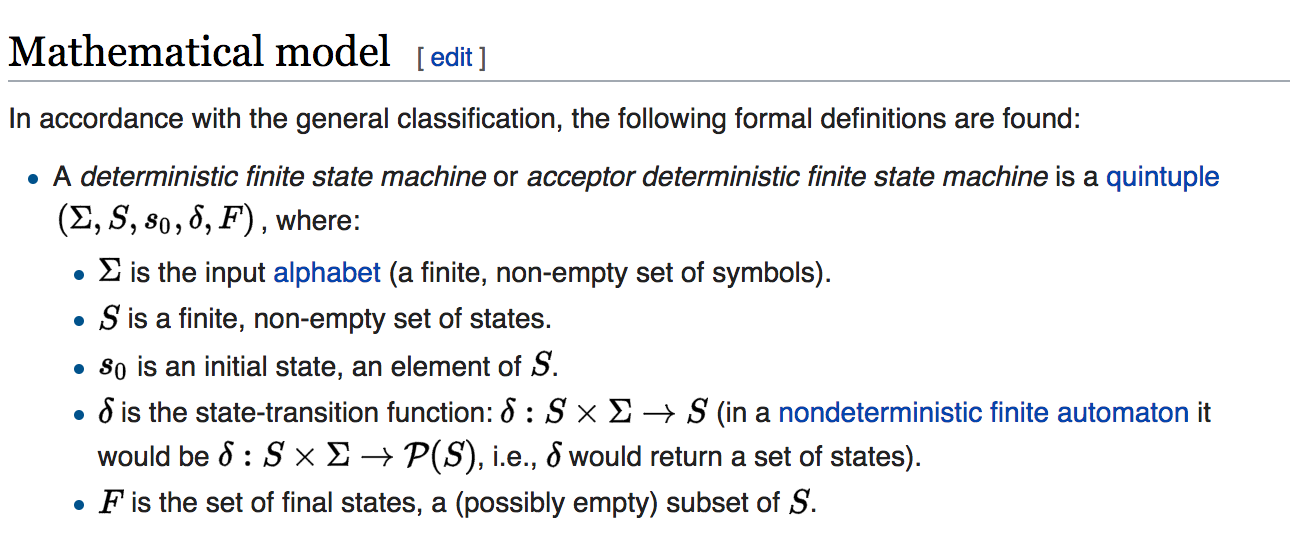
Finite state machines
-
have one initial state
-
a finite number of states
-
a finite number of events
-
a mapping of state transitions
triggered by events -
a finite number of final states
Idle
Pending
Rejected
Fulfilled
Fetch
Resolve
reject
Idle
Searching...
SEARCH
Success
Failure
RESOLVE
REJECT
SEARCH
SEARCH
SEARCH

first
intermediate
second
UPDATE DATA
After .3 seconds
Click
Click
const machine = {
initial: 'idle',
states: {
idle: {
on: { SEARCH: 'searching' }
},
searching: {
on: {
RESOLVE: 'success',
REJECT: 'failure',
SEARCH: 'searching'
}
},
success: {
on: { SEARCH: 'searching' }
},
failure: {
on: { SEARCH: 'searching' }
}
}
};function transition(state, event) {
return machine.states[state].on[event];
}Define transitions between
states & actions
Transition function determines
next state from state + event
State machines in
VS Live Share

Signed out
Signing in
Signed in
SIGN IN
SIGN IN SUCCESS
SIGN IN FAILURE
Sharing...
Shared
Joining...
Joined
share
share Success
Join Success
Join
Leave
End Collab session
Sign in
Using state machines
for analytics
transition(currentState, event) {
const nextState = // ...
Telemetry.sendEvent(
currentState,
nextState,
event
);
return nextState;
}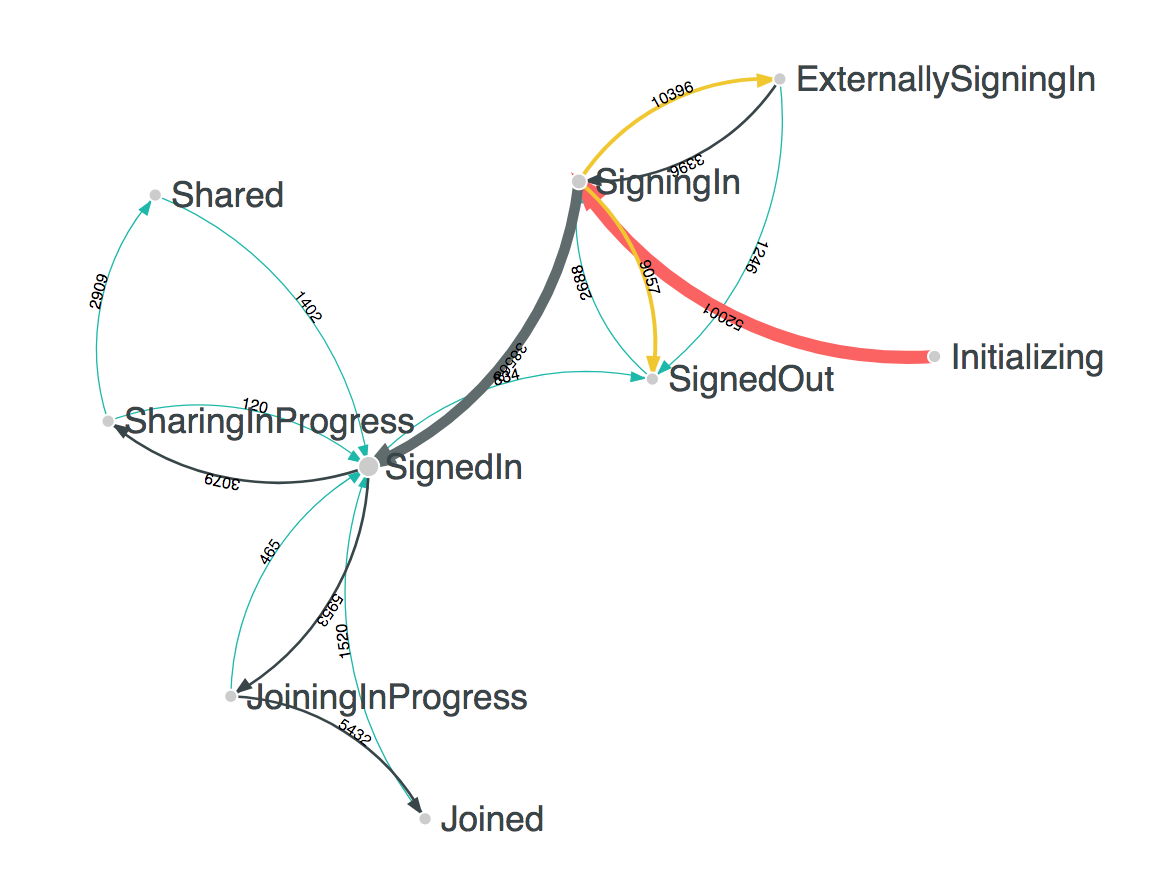
Using state machines
for analytics
A
B
C
D
E
Using state machines
for integration testing
- Shortest path algorithms (Dijkstra, Bellman-Ford, A* search, etc.)
- Analytics provides weights
- Represents all happy paths
- Can be automatically generated
A
B
C
D
E
A → B
A → B → C
A → D
A → D → EUsing state machines
for integration testing
- Depth-first search (DFS) algorithm for finding all simple paths
- Represents all possible user flows
- Reveals all edge cases
- Can be automatically generated ⚠️
A
B
C
D
E
A → B
A → B → C
A → D
A → D → E
A → D → E → C
A → D → B → C
A → B → E → C
A → D → E → B → C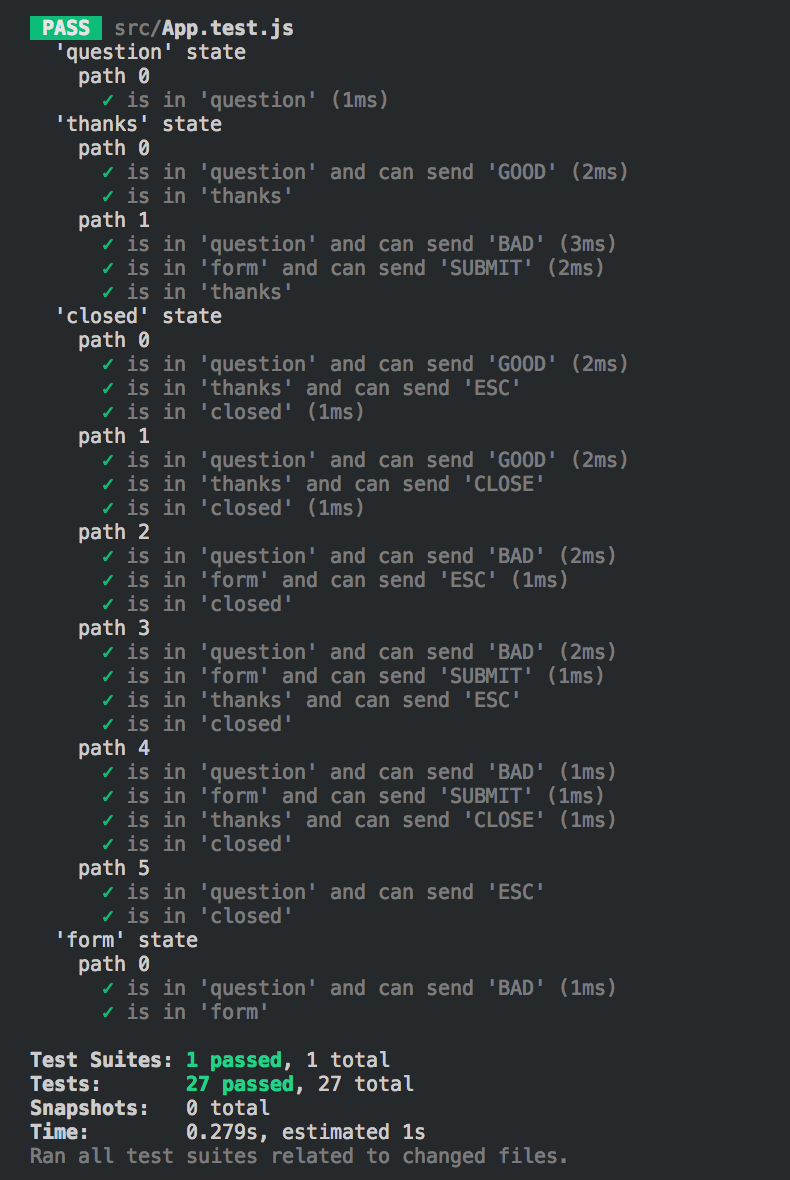
Using state machines
for integration testing

Software bugs are
made visually clear
idle
loading
success
failure
FETCH
RESOLVE
ERROR...?
Error
RETRY
Does this scale?
Harel Statecharts
extended finite state machines
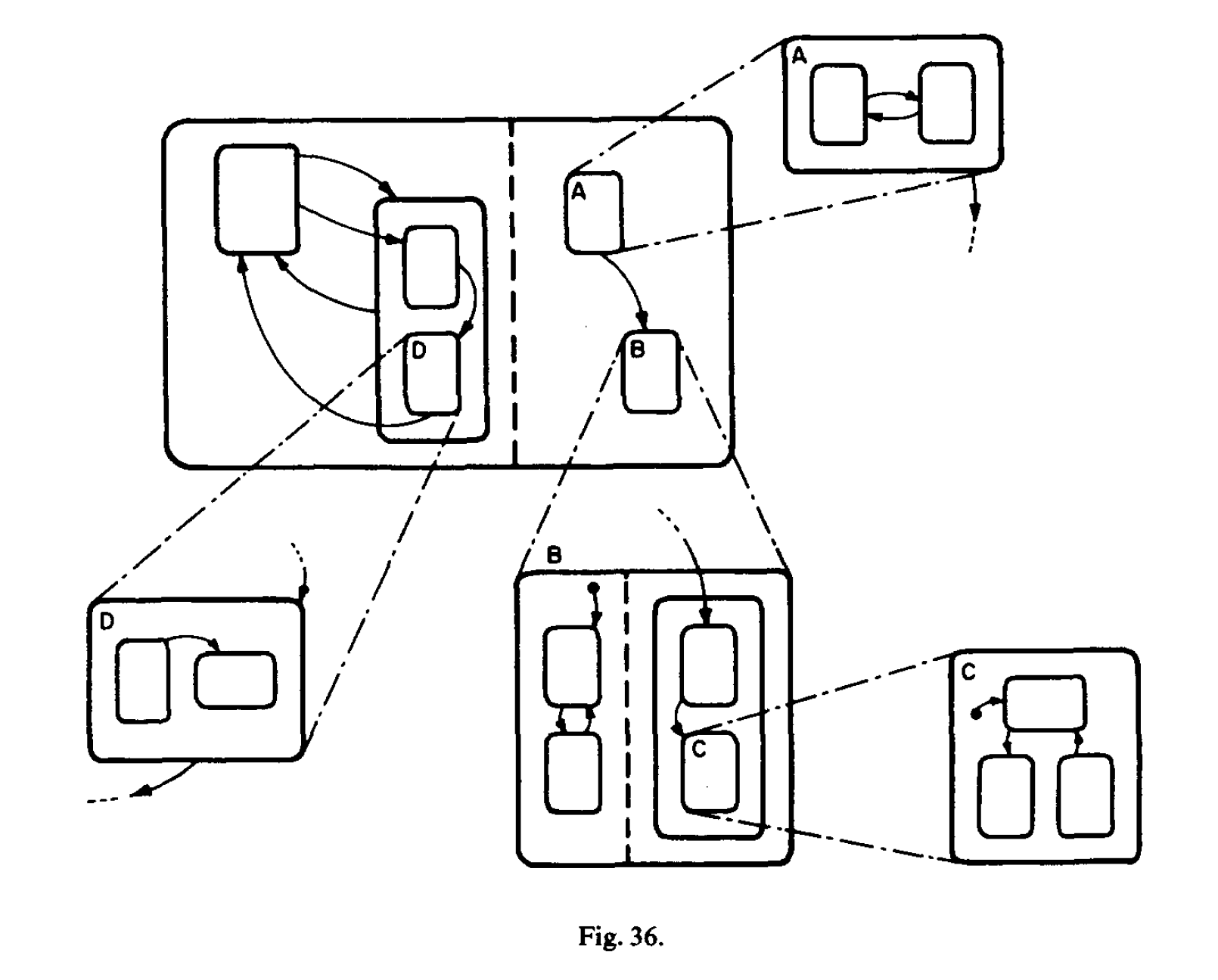
Statecharts
Idle
Searching...
onEntry / prefetchResources
onEntry / fetchResults
Search
- Actions - onEntry, onExit, transition
- Guards - conditional transitions
[query.length > 0]
Statecharts
- Actions - onEntry, onExit, transition
- Guards - conditional transitions
- Hierarchy - nested states
- Orthogonality - parallel states
- History - remembered states
H
Bold ON
Bold OFF
Italics ON
Italics OFF
Underline ON
Underline OFF
Characters
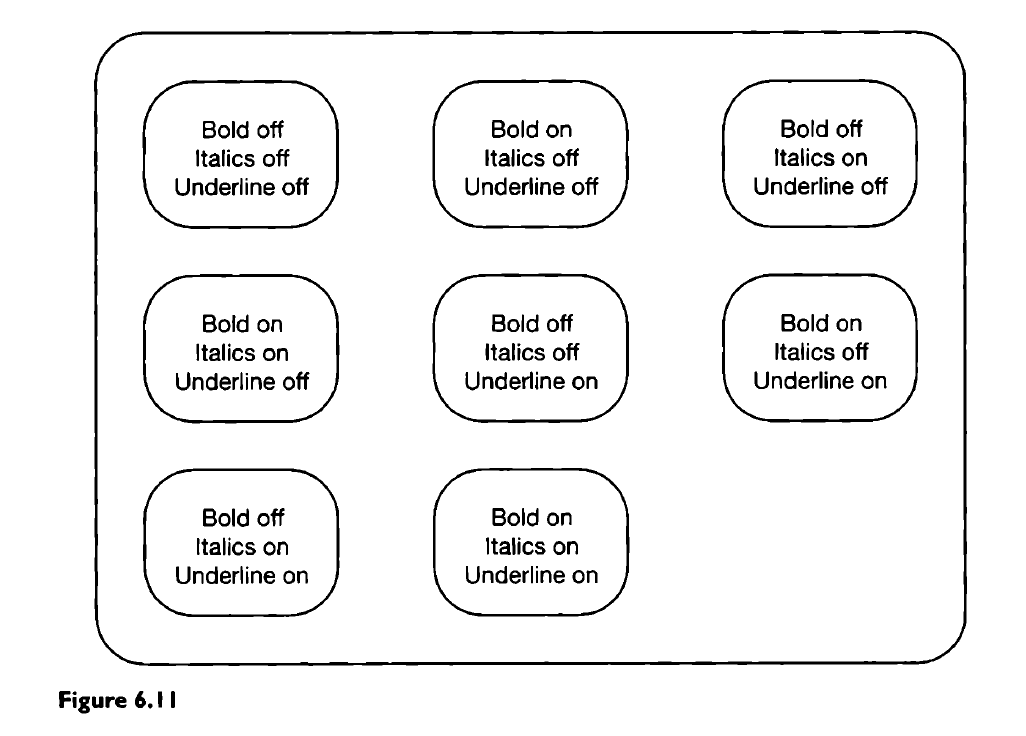
Idle
Searching...
SEARCH
Success
Failure
RESOLVE
REJECT
SEARCH
SEARCH
SEARCH
Idle
Searching...
SEARCH
Success
Failure
RESOLVE
REJECT
SEARCH
SEARCH
Searched
Statecharts
with xstate
npm install xstate --save
- Actions - onEntry, onExit, transition
- Guards - conditional transitions
- Hierarchy - nested states
- Orthogonality - parallel states
- History - remembered states
const lightMachine = Machine({
initial: 'green',
states: {
green: {
on: {
TIMER: 'yellow'
}
},
yellow: {
on: {
TIMER: 'red'
}
},
red: {
on: {
TIMER: 'green'
}
}
}
});
const nextState = lightMachine
.transition('green', 'TIMER');
// State {
// value: 'yellow'
// }const lightMachine = Machine({
initial: 'green',
states: {
green: {
on: {
TIMER: 'yellow'
}
},
yellow: {
onEntry: ['activateYellow']
on: {
TIMER: 'red'
}
},
red: {
onExit: ['stopCountdown']
on: {
TIMER: 'green'
}
}
}
});const lightMachine = Machine({
initial: 'green',
states: {
green: {
on: {
TIMER: {
yellow: {
cond: (xs, event) =>
event.elapsed > 10000
}
}
}
},
yellow: {
on: {
TIMER: 'red'
}
},
red: {
on: {
TIMER: 'green'
}
}
}
});const lightMachine = Machine({
initial: 'green',
states: {
green: {
on: {
TIMER: 'yellow'
}
},
yellow: {
on: {
TIMER: 'red'
}
},
red: {
initial: 'walk',
states: {
walk: {
{ on: { PED_COUNTDOWN: 'wait' } }
},
wait: {
{ on: { PED_COUNTDOWN_END: 'stop' } }
},
stop: {}
}
}
}
});const lightsMachine = Machine({
parallel: true,
states: {
northSouthLight: {
initial: 'green',
states: {
// ...
}
},
eastWestLight: {
initial: 'red',
states: {
// ...
}
}
}
});const payMachine = Machine({
initial: 'method',
states: {
method: {
initial: 'card',
states: {
card: {
on: { SELECT_CASH: 'cash' }
},
cash: {
on: { SELECT_CARD: 'card' }
}
},
on: {
NEXT: 'review'
}
},
review: {
on: {
PREV: 'method.$history'
}
}
}
});class App extends Component {
static machine = Machine({ /* ... */ });
state = {
appState: machine.initialState
};
actions = { /* ... */ };
send(event) {
const nextState = machine.transition(
this.state.appState,
event.type,
this.state
);
const { actions } = nextState;
this.setState(
{ appState: nextState },
() => {
const nextExtState = actions
.reduce((extState, action) => {
const command = this.actions[action];
// Execute the command
return command(extState, eventType) || extState;
}, this.state);
this.setState(nextExtState);
}
);
}render() {
return (
<form onSubmit={() => this.send('SUBMIT')}>
<input
type="text"
onChange={e => this.send({
type: 'CHANGE',
value: e.target.value
})}
/>
<button>Submit</button>
</form>
);
}
import { scan } from 'rxjs/operators';
const machine = new Machine({/* ... */});
const event$ = // ...
const state$ = event$.pipe(
scan(machine.transition),
tap(({ actions }) => {
// execute actions
});const machine = new Machine({/* ... */});
export const reducer = machine.transition;
// ...
class App extends Component() {
// ...
componentDidUpdate() {
const { state } = this.props;
const { actions } = state;
const nextState = actions.reduce(action => {
// execute the action commands
}, this.state);
// local state, or send it to Redux
this.setState(nextState);
}
// ...
}
machine.transition() is
just a reducer function!

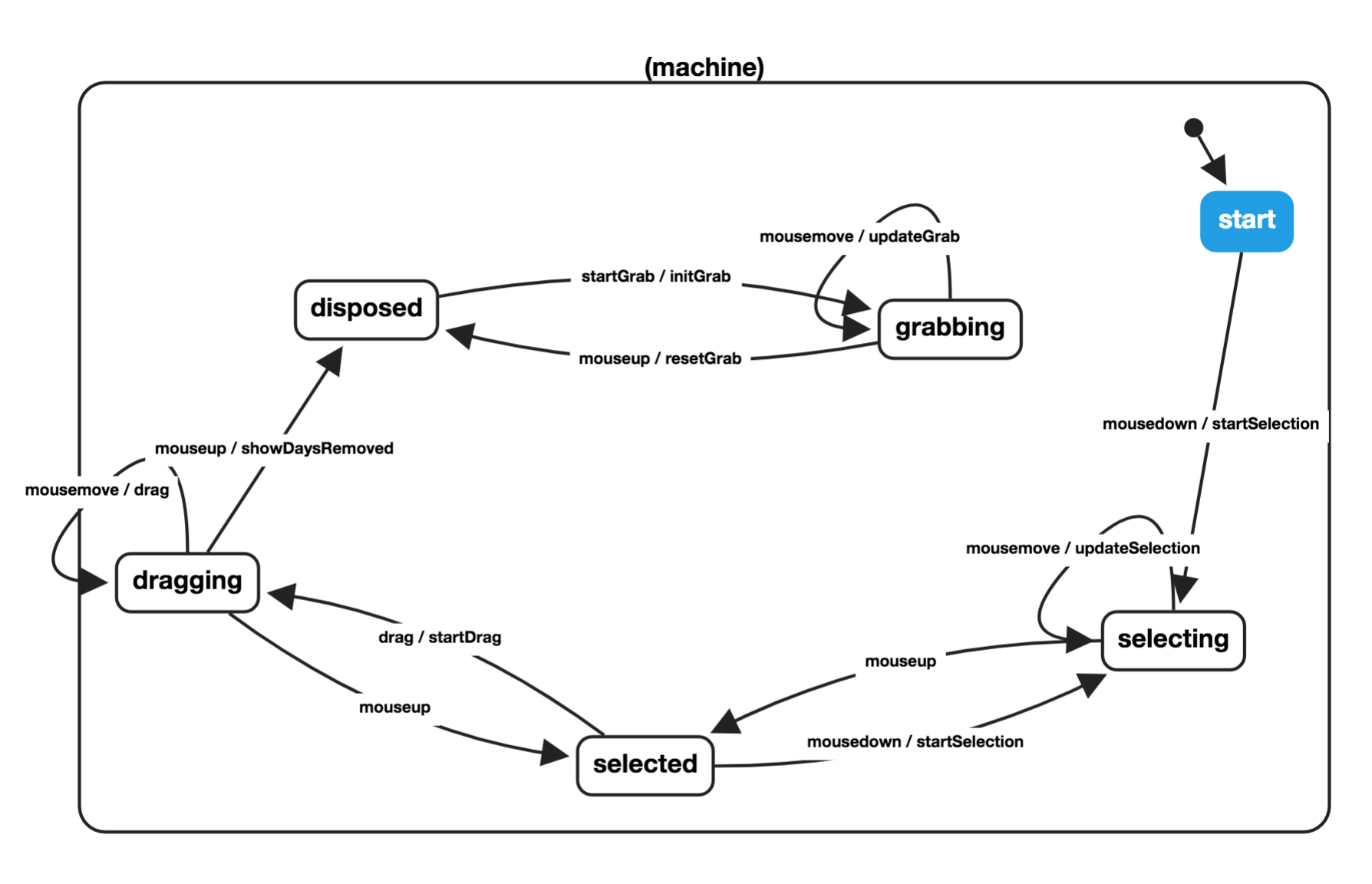
Advantages
of using statecharts
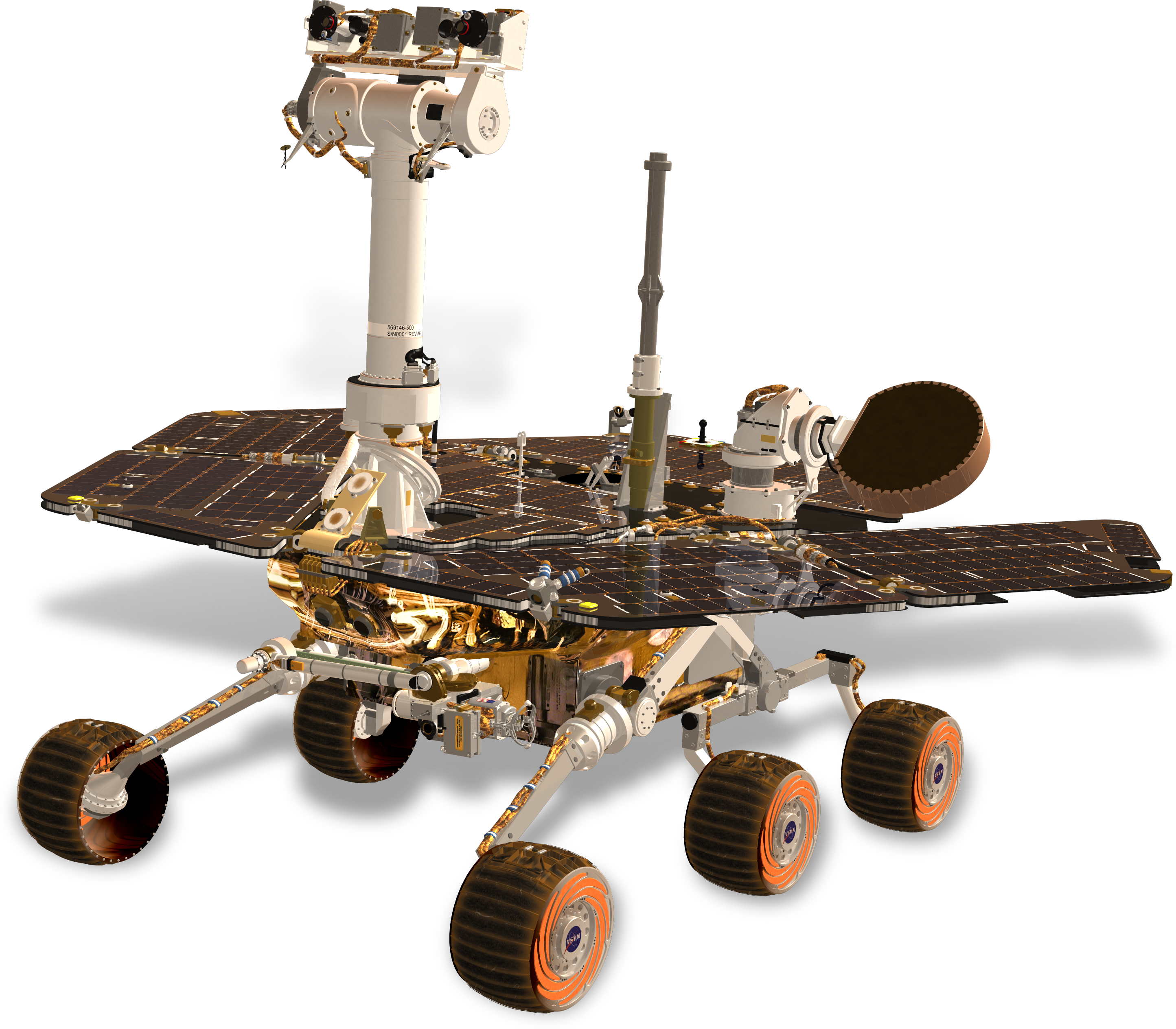
- Visualized modeling
- Precise diagrams
- Automatic code generation
- Comprehensive test coverage
- Accommodation of late-breaking requirements changes



Disadvantages
of using statecharts
Learning curve
Modeling requires planning ahead
Not everything can be modeled (yet)

Statecharts
FSMs
Bottom-up
Complexity
trade-offs
States & logic
Code Complexity
Statechart
visualization?
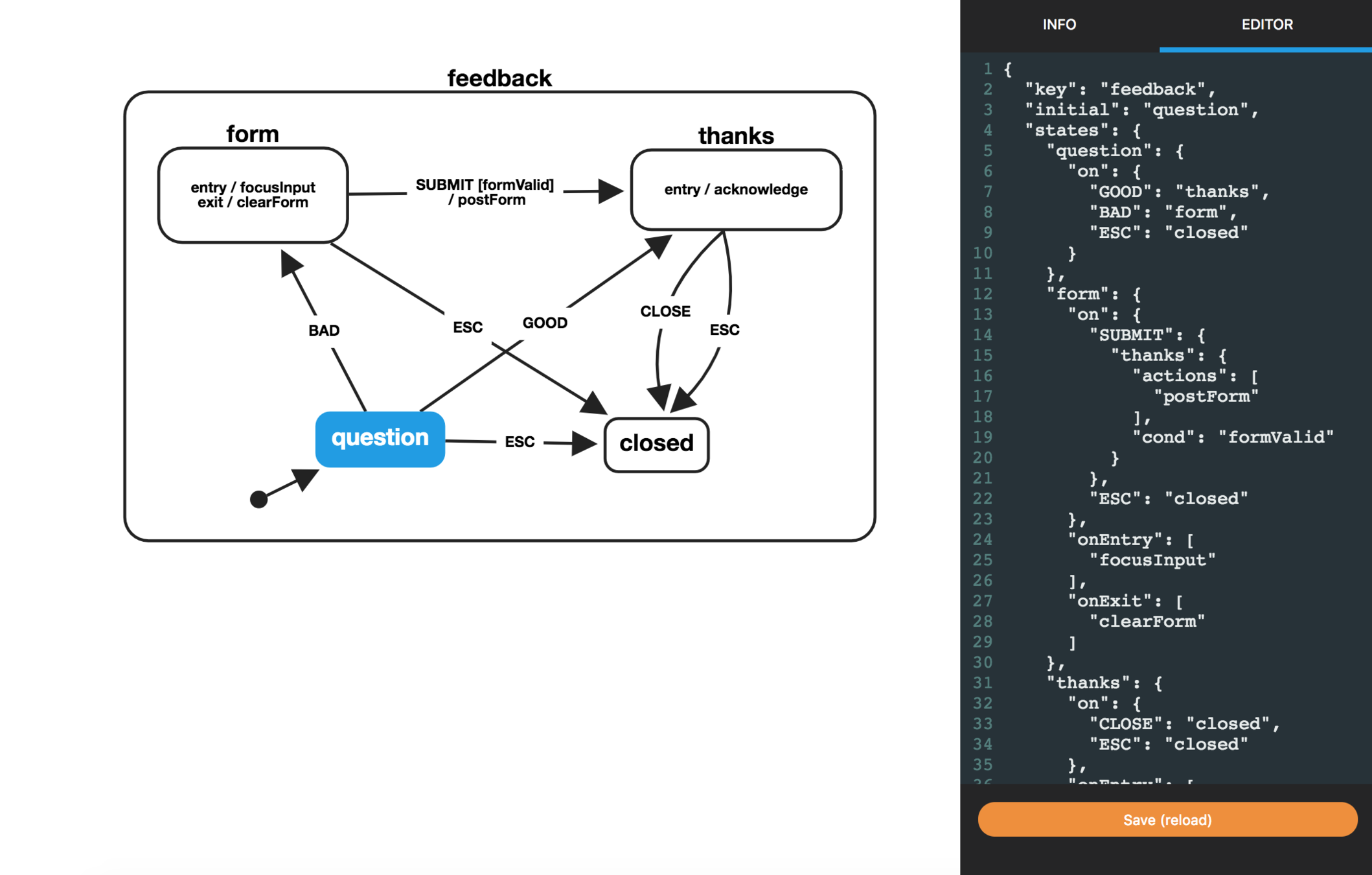
BETA!



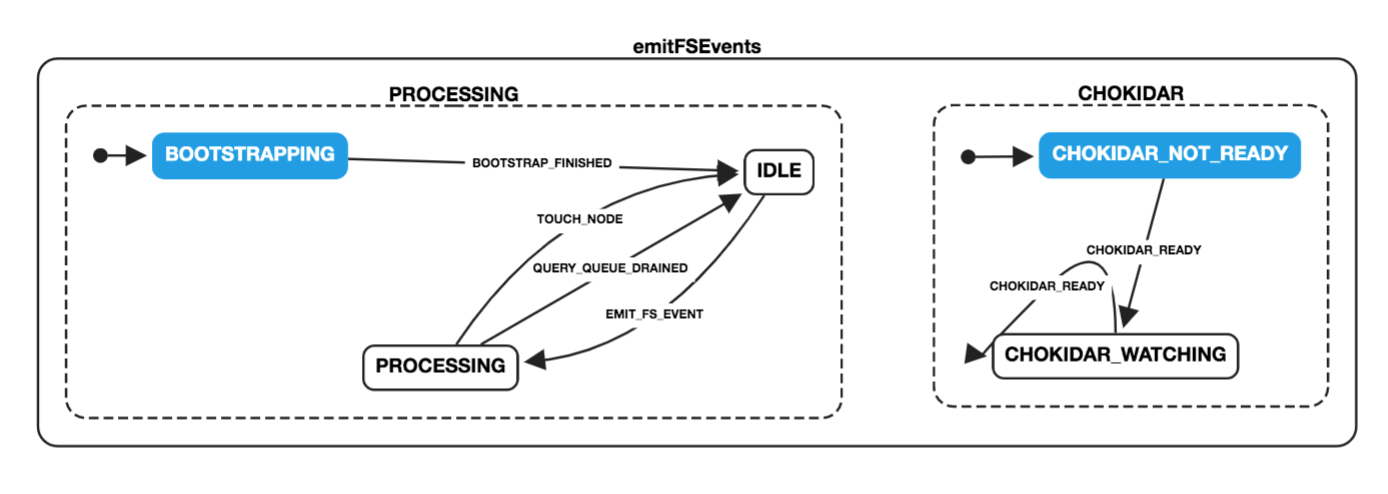
- I just pushed our first couple statecharts to production this afternoon. We have a medical calculator in our app that handles dose calculations.
- The logic was slowly growing more confusing, especially with subtle UX tweaks as the component was maintained.
- We rewrote with a statechart and everything is much clearer! Hopefully less bugs going forward.

The future
of xstate

- Full SCXML support and conversion
- A reactive interpreter
- Editable visualization tools
- Analysis and testing tools
xstate 3.2 just released!
- Any state can transition to any state
- Actions can be functions 🎉
- Support for internal transitions
- Support for raised events
- Support for transient states/transitions
- Support for conditional transition arrays
- (WIP) More SCXML conversion
Resources
- The World of Statecharts - Erik Mogensen
- Statecharts: A Visual Formalism for Complex Systems - David Harel (PDF)
- Constructing the User Interface with Statecharts - Ian Horrocks (book)
- xstate documentation
- How to model the behavior of Redux apps using statecharts - Luca Matteis
- React Automata - Michele Bertoli
- Pure UI - Guillermo Rauch
- Pure UI Control - Adam Solove
and tools
Write once, write anywhere
Learn once, write anywhere
Model once, implement anywhere
Let's improve the way we develop.
Thank you React Finland!
@davidkpiano · React Finland 2018